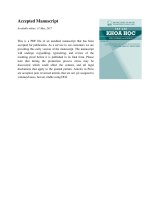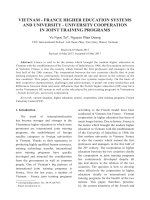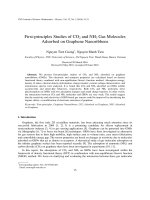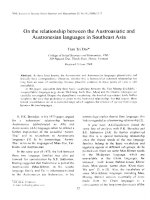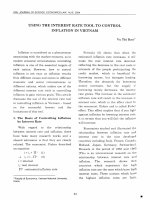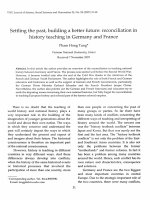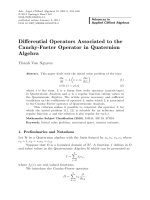DSpace at VNU: Power Relation Negotiation between Writers and Readers Embedded in Some CNN Commentaries
Bạn đang xem bản rút gọn của tài liệu. Xem và tải ngay bản đầy đủ của tài liệu tại đây (133.42 KB, 11 trang )
VNU Journal of Science: Foreign Studies, Vol. 31, No. 4 (2015) 61-71
Power Relation Negotiation between Writers and Readers
Embedded in Some CNN Commentaries
Trần Thị Vân Thùy*
Hanoi University of Home Affairs, 36 Xuân La, Tây Hồ, Hanoi, Vietnam
Received 17 August 2015
Revised 18 November 2015; Accepted 23 November 2015
Abstract: Power relations exist between social groups, institutions, women and men, young and
old, ethnic groups, etc. In mass media discourses, they exist between authors and viewers, listeners
or readers. Besides, it is said that power relations are always relations of struggle – the term which,
according Norman Fairclough [1], is used in a technical sense to refer to the process whereby
social groups with different interests engage with one another. If applying Fairclough’s view to the
case of CNN commentaries which are used in our investigation, media discourses can be seen as
sites where text producers exercise their power through well-written language; and thus, they
should be involved in a struggle (a power relation negotiation) with assumed readers over whom
they supposedly want to influence their opinions. In this kind of struggle, this paper demonstrates
that the writers exercise their power via linguistic means while taking into due consideration the
‘ideal’ readers’ position. It could be claimed that throughout the media discourses, commentators
do have to negotiate the power relations with assumed readers.
Keywords: Assumed readers, ‘ideal’ readers, mass media discourses, power relations, power
relation negotiation.
1. The subject and the scope of the study*
influential
and
important
journalistic
mainstreams – commentary. They are media
discourses taken from CNN, opinion page – a
prestigious news source in America. The first
one is the commentary entitled ‘Are you
addicted to the Internet’, written by Dr
Catherine Steiner-Adair – an internationally
recognized school consultant and author of the
famous book ‘The Big Disconnect: Protecting
Childhood and Family Relationships in the
Digital Age’; the second commentary, ‘Help
each other, not ISIS’ belongs to Dean
Obeifallah, a columnist for the Daily Beast and
The study is only a small-scaled language
analysis on power relation negotiation with the
subject being some CNN commentaries on
socio-political problems. There will be three
articles being put under close investigation in
order to unravel the seem-to-be unequal
relations between commentators and readers,
and to find out how this kind of relationship is
embedded and negotiated in one of the most
_______
*
Tel: 84-983230159
Email:
61
62
T.T.V. Thùy/ VNU Journal of Science: Foreign Studies, Vol. 31, No. 4 (2015) 61-71
editor of the politics blog The Dean’s Report;
and last but not least is ‘The sex freak-out of
the 1970s by Sally Kohn, a CNN political
commentator.
As widely accepted, commentaries are
omnipresent; they can be found abundant in
CNN; thus, finding materials for this study is
obviously not a challenging job; yet, finding the
right ones which could match the aim of this
paper is a hard task. The three commentaries
used in this paper are carefully chosen basing
on two main criteria; the first one is the prestige
of the commentators: Dr Catherine SteinerAdair, Dean Obeifallah, and Sally Kohn are the
writers of high credit; they often have their
commentaries posted on CNN, and their works
always attract a lot of comments from the
readers. The issues that are discussed directly in
the commentaries account for the second
criterion; and such topics as Internet addiction,
ISSI, and sexual revolution would be of great
interest and relevance to our current world.
There are many approaches to the study of
language, namely, linguistics, sociolinguistics,
pragmatics, cognitive psychology and artificial
intelligence, conversation, discourse analysis in
social psychology and critical discourse
analysis (CDA), amongst others. This study is
carried out under the light of CDA because
talking about CDA is talking about taking some
political stance to analyze language and via
CDA, language is seen in close relationship
with power and ideology, which are all of
relevance to this small study.
2. Theoretical basis: CDA – Power – ideology
and mass media discourse
In the view of Norman Fairclough [1],
discourse is seen as a favoured vehicle of
ideology; and the exercise of power in modern
society is increasingly achieved through
ideology, and more particularly through the
ideological workings of language. Thus, it can
be said that power, ideology and language are
closely knitted; and talking about CDA means
talking about power, ideology and how they are
reproduced through language. In the book
entitled “Language and Power” [1], Norman
Fairclough mentioned one important aspect
concerning discourse usage, that is, how
discourse is related to unequal measures of power.
It is crystal clear that language and power
have strong and bonded relations. Rarely do
people enter some kind of meaningful
communicative situations without attaching to
their talks specific aims and their pre-supposed
positions; and consciously or unconsciously,
they show their role, their power in those kinds
of discourses. Norman Fairclough once had an
interesting discussion specifically on two major
aspects of the power/language relationship, be it
power in discourse and power behind discourse;
and he also touched on the hidden relations of
power [1]. That is when he talked about written
language, and the growth area for this sort has
been the mass media – namely, television,
radio, film as well as newspapers. What needs
to consider here is that in contemporary society
discourses where participants are separated in
place and time are prolific and plenteous;
hence, it is essential and important for us to do
some studies on this kind of discourses.
In terms of mass media discourses in
general and commentaries in particular, one of
their prominent features is the ‘one-sidedness’,
that means if in face-to-face interaction,
participants alternate between being the
producers and the interpreters of the text, in
media discourses there is a sharp divide
between producers and interpreters. There
T.T.V. Thùy / VNU Journal of Science: Foreign Studies, Vol. 31, No. 4 (2015) 61-71
seems to be just writers who are present in the
scene with the absence of the second
participants.
Another striking characteristic that we
should bear in mind is that media discourses are
designed for mass audience, and there is no way
that producers can even know exactly who is in
the audiences; thus, they produce language with
some interpreters in mind, or put it more
simply, what they do is address an ideal
/assumed subject, be it viewers, or listeners, or
readers. Media discourses have built into it a
subject position for an ideal subject.
Among
various
media
discourses,
commentaries are considered one of most
important journalistic types, and they are
typical of dexterously written language where
power relation struggles, power relation
negotiation and ideologies are richly and
implicitly presented. Commentaries are often
said to be the individual products and they bear
the writers’ distinguished identity. Writing this
sort of articles, ‘producers’ all know clearly that
they are in the ‘battle’ in which they have to try
to win the readers’ heart and mind through
linguistic means; and this work obviously
requires great efforts and art in accurate and
effective language use so as to control a fully
biased text with the purpose of invading the
target audience ideologically and politically and
ultimately of persuading or manipulating them
to their pre-set aims without their notice.
However, without the ‘real’ appearance of
the readers, whether the writer holds the whole
power in the discourse? Do ‘ideal readers’ have
some position in the written text and in
commentator’s mind? And thus, is the
negotiation of power relations between the
writer and assumed readers embedded in his/her
discourse? They are all interesting questions
63
related to power relations that are of the core of
this linguistic study.
3.
Power
relation
commentaries
negotiation
in
3.1. The choice of wordings
Right from the beginning of each
commentary taken from CNN opinion page,
there is always small, yet unequivocal caption
saying: ‘the opinions expressed in this
commentary are solely those of the author’. It
sounds like the assertion for the text producer
that he/she would step into the discourse with
the whole power to express his/her views on
some socio-political problems; and hence,
he/she has the absolute right to demonstrate the
thoughts linguistically in his/her own way
regardless of others’ opinions on the same
subject. However, is it the case? If we
understand the power relationship between the
commentary writers and the readers following
this cliché, we are easily misled into the jungle
where, we, the target readers, are completely
lost in the ideological battle set up by the
authors, and become the passive-information
receivers.
But why do we have such cliché?
Obviously if seen from the surface, we can
notice without difficulty that in commentaries,
the writers often draw on a clear classification
scheme in order to express their views while
claiming their political stance explicitly; that is
to say, they voice their thoughts in favor of, or
in opposition to the issue mentioned in the
discourse. How can they do so? A careful and
thoughtful choice of wordings helps them
achieve their seem-to-be-superior-to-the-reader
position.
64
T.T.V. Thùy/ VNU Journal of Science: Foreign Studies, Vol. 31, No. 4 (2015) 61-71
In the commentary “Are you addicted to the
Internet’ by Dr Catherine Steiner-Adair [2], a
classification scheme is drawn upon in
opposition to the addiction to the internet with
the support of such words as ‘excessive
computer
gaming’,
‘alarming
trend’,
‘compulsive Internet use’, ‘growing concern’,
‘bad habits’, ‘feeling of loss’, ‘problematic
relationship with tech’, ‘digital gadget
overusing’, ‘health concern’, deeper damage’,
‘chronic
tension’,
‘emotional
distress’,
‘decreased performance at work, at school, and
in life’, ‘obstacle to emotional intimacy’,
‘restless’, ‘angry’, depressed’, etc. These words
act as the important reminders of the problem
brought up in the discourse, giving the
prominence to the discussed issue while serving
the author’s ideological purpose of imprinting
onto the readers’ mind the writer’s negative ideas.
One could argue that all the words listed
above just help build up a particular ideological
representation of the reality, they have nothing
to do with the power relation negotiation
between the commentator and readers;
however, if we look deeper at the connotation
of each word, we can notice that each one was
chosen purposefully with the aim of projecting
the author’s negative attitudes towards the
internet addiction problem, and this is
obviously her strategy of drawing up the
common ground with the readers, and then their
solidarity, their agreements on her views, which
is where relational values of the words come
into the picture. This hidden, yet interesting
aspect could be easily discovered if analyzing
the words up close.
To bring up the problem of internet
addiction, Catherine didn’t simply employ such
words as computer game using or internet
problem; instead she added some strong
adjectives before each noun: ‘excessive’ was
chosen, not the word ‘much’ (excessive
computer gaming); not ‘normal’ or ‘bad’, but
‘alarming’ (trend); not ‘regular’ or ‘voluntary’,
but ‘compulsive’ (Internet use); and not
‘normal’, ‘big’, but ‘growing’ (concern); etc.; in
addition, she often opted for ‘big words’ when
mentioning to the Internet overuse in the
society: ‘an addiction’, ‘a complicated ….
social problem’, ‘a social phenomenon’, ‘an
urgent heath concern’, ‘bad habits’; and she
also wielded the words: ‘feeling of loss’,
‘chronic
tension’,
‘emotional
distress’,
‘compromised physical health’, ‘restlessness’,
‘irritability’, ‘anger’, ‘anxiety’ to talk about the
blatant and worst effects of this problem on
people. Through careful choice of wordings,
she skillfully led the readers to accept her
opposing views to the internet addiction; she
definitely knew such strong, powerful words
with negative nuances could help build up the
common ground with the readers, and thus, she
could sway their positions, their opinions to
hers: the problem is obviously there, and
everywhere; and it is serious, hence, we would
have to acknowledge it, though its being the
‘hard truth’, to find out the solutions, the
extensive treatments.
Likewise, Dean Obeifallah in his
commentary entitled ‘Help each other, not ISIS’
[3], he defended the true Muslim Americans by
the words: ‘inspiring interfaith work’ (done by
Muslim community), ‘their close and mutually
respectful working relationship’, ‘local
Tennessee
Muslim
community
leaders
unequivocally condemning, denouncing the
attach’, etc. By making his classification
scheme blatant, the author was working his
ideological way into the mind of the readers,
creating the feeling that he was controlling
them by imposing his ideas without their notice.
Once again, we witness the use of strong words:
T.T.V. Thùy / VNU Journal of Science: Foreign Studies, Vol. 31, No. 4 (2015) 61-71
‘condemn’,
‘denounce’,
‘thoughtful
denunciation’, and vividly positive adjectives:
‘inspiring’, ‘respectful’. Step by step, the author
brings the assumed readers to his views:
Muslim
Americans
are
condemning,
denouncing the terrible deeds committed by
Muslim terrorists, and they are engaging in
inspiring, respectful works for the community;
and thus, we shouldn’t define Islam to many
Americans, they have nothing in common with
‘bad actors’, other than sharing – in name only
– a faith.
The similar scenario is resorted to when the
author touches on the ‘wrongful’ judgments
made by some individuals towards the true
Muslim Americans, yet via a striking difference
in the choice of words: (media business model,
under which) ‘sensationalism sells’; ‘the hate
spewed’ (by certain U.S. elected officials, the
professional anti-Muslim bigots and some far
right religious clerics); ‘their demonization’,
‘outlandish allegations’, ‘debunked claim’,
‘baseless, fear mongering comments’. Such
words as spewed, demonization, outlandish,
debunked or baseless, mongering clearly show
the negative evaluations of the author to the
reality depicted in the discourse; via this way,
the commentator would like to picture into the
ideal readers’ mind the ‘wrongful’, irrational
attitudes of some people towards the Muslims
in general. We can see that the author is doing
the relation power negotiation with the assumed
readers carefully and thoughtfully by leading
them through his views with the help of
purposefully chosen words in order to construct
up the commonality between them: we need to
stand united, true American Muslims deserve to
be part of the fabric of America; and if we listen
to the ‘demonization’, the wrongful judgments
of certain U.S. elected officials, we are helping
ISIS, not each other in the fight against
65
terrorism by driving away true American
Muslim to the path of radicalization.
Unequivocally, instead of imposing his views
right away, the commentator dexterously draws
up the approval of the readers to the right deeds
done by true Muslims first, then shows that ‘the
debunked claims’, ‘demonization’ … are not
right in the time when we actually need the
unity, the solidarity among people so as to
isolate and eradicate ISIS.
In another commentary ‘The sex freak-out
of the 1970s’ [4], CNN political commentator,
Sally Kohn, shows her views in favor of the
effect of the sex revolution of the 1970s: she
described the effect of this period with the
words ‘enduring and profound’, and she called
the songs of the 1970 which captured all
perspectives on the sexual revolution being
‘quintessential’. When mentioning to the
achievements in the sexual revolution of the
1970s, she employed the words ‘cultural
triumphs’, ‘victory’, ‘the greatest legacy’, etc.
According to the Advanced Learner’s
Encyclopedic Oxford Dictionary, ‘enduring’
means ‘last for a very long time’; ‘profound’
means ‘very great; or felt, experienced very
strongly’; ‘quintessential’ means ‘representing
the most perfect or typical example of a quality
or class’. We can easily notice that in
convincing the readers to her views, the author
readily opts for words which could speak her
mind the best while influencing the ideal
readers the most. And because the readers are
not present in the scene, she does have to
account for their positions with the
presupposition that the extreme words might
draw assumed readers’ views close to the
author’s ideologically. Via Sally’s choice of
words, we can come to realization that in
making clear and prominent her stance she also
wants to influence the readers ideologically by
66
T.T.V. Thùy/ VNU Journal of Science: Foreign Studies, Vol. 31, No. 4 (2015) 61-71
bending their minds to her thoughts: the sexual
revolution in the 1970s could be the freak-out
of that time, but it has an enduring and
profound impact onto the present; and the
‘legacy’ of that era also shows us that we’re not
satisfied yet, there are still a lot of things
needed to be done to truly liberate us all.
In the seem-to-be-unequal relations
(between present authors and absent readers)
embedded in commentaries, the authors are in
the position of manipulating while persuading
the readers to their views. However, they do
their ideological job implicitly, we cannot see it
on the surface; only when digging deep into the
layers of carefully chosen words might we
unravel the ideological power of the discourse,
especially the power relation negotiation
between the readers and the author embedded in
the discourse.
Undeniably the commentators do have to
account for the readers’ position because
besides ‘big’ words and strong adjectives as
listed in the above examples, we can see the
appearance of some ‘racist’ words. The
presence of such words truly shows the authors’
negotiating their relationship with assumed
readers, and very often, the authors assume
commonality of values with them. The words
‘terrorist’, ‘extremist’ used in the article ‘Help
each other, not ISIS’ by Dean Obeifallah help
bring in negative connotations of evil and
violence; the word ‘addict’ in the article ‘Are
you addicted to the internet’ by Catherine
Steiner-Adair also pictures in the readers’ mind
the image of a bad person; the same thing also
applies to the words ‘subjugation’ (conjuring up
the picture of a slave), ‘racism’ (depicting
negative attitude of prejudice, discrimination or
antagonism against someone of different race)
and ‘sexism’(discrimination against women) in
the article ‘The sex freak-out of the 1970s’.
Through such words, we would come to the
understanding that there still exists racism,
sexism, and subjugation based on gender, race
and sexuality in modern time; thus, we still
need the ‘desire’ from the legacy of the 1970s
to keep fighting for a true liberation.
Moreover, richly ideology-woven words are
very good tools for commentators in their
showing power, while finding the common core
with the target readers. Why is it so? We can
see clearly that under the literal meaning of the
word ‘spew’ (in ‘Help each other, not ISIS’),
for example, there exists a negative attitude of
the writer towards certain U.S. elected officials,
the professional anti-Muslin bigots, and some
far right religious clerics:
‘The hate spewed by certain U.S. elected
officials, the professional anti-Muslim bigots
and some far right religious clerics.’,
In the meantime when listing out the saying
of Antelpli – a chief representative of Muslim
Affairs, a person that the commentator is in
favor of, he used the word ‘explain’ instead of
the word ‘spew’. We can pick up this sentence
just two sentences before the sentence
containing the word ‘spew’:
‘As Antelpli explained, the radicalization is
not coming from mosques.’
The writer, in this case, presumably
assumes that the word ‘spew’ would constitute
negative evaluations for the readers, and the
word ‘explain’ would constitute a more positive
evaluation. Thus, when choosing this word to
talk about this person and that word to mention
to another, the author is expecting the readers to
have that common ground with him, and by
doing so, he is negotiating the power position
with the readers implicitly.
Similarly, the word ‘hard truth’ appeared in
‘Are you addicted to the Internet?’ bears the
T.T.V. Thùy / VNU Journal of Science: Foreign Studies, Vol. 31, No. 4 (2015) 61-71
similar value. Catherin would know that she is
bringing up the issue which to most of us is
normal one, and there would be many saying: it
is not necessary to make a fuss about it, for she
already predicted in the article: ‘Some of us
could feel powerless in our relationship with it.
But addiction?’. Employing the word ‘hard
truth’, the author puts a lot of her ideologies in
that: we all know the truth, that we all love our
tech, and we are falling into the bad habits of
excessive and compulsive use of the internet;
but it is not easy to accept the fact we are
turning to be slaves to it, becoming addicted to
it, we are denying our present problem by
hiding behind the beautiful excuse: we just love
our digital devices too much. With the word
‘hard truth’, the commentator would like to
show and to share, not to impose the views (on
internet addiction) on readers: it’s time to face
the truth, though it is hard to accept it , yet we
need to cope with it, deal with it and find
solutions to it.
What is more, the formality of word using
is also related to the relational value. In the
commentaries, writers create their own writing
with ‘ideal’ readers in their mind; they do not
know exactly who would read their products:
some people may get access to them, or maybe
many would view the discourses online. This
formality of the situation demands the formality
of social relations; thus, they often opt for
formal choices of words and phrases with the
aim to demonstrate their position, their status
and at the same time to express their politeness
and concerns for the assumed readers. We can
find words and phrases such as:
… poses to children …; … treat the
phenomenon as …; ….as requiring further
study…; …experts rightly debate …; come
to terms with ..; we … would be wise;
…the extremes merit our attention; …we
…acknowledge the problems … (in Are
you addicted to the Internet)
67
I would predict that ….; local Tennessee
Muslim community leaders … condemned
…; religious services, which were to
celebrate …; …the reality was that …; …
who claimed ….; who stated ….; (in Help
each other, not ISIS)
…saw the convergence of …; Cohen
…noted that…; …helped pave the way; the
‘70s …brought …into the spot light; …
what became known as …; yet, the fact that
…; … empowerment hasn’t … translated
into …; (The sex freak-out of the 1970)
However, the text producers sometimes do
adopt the strategy of using informal ways of
writing to draw readers close to their views
though most of the time they resort to the
formal choices. This is evident in such
examples as: ‘But addiction?’ (Are you
addicted to the internet?); ‘Let’s …’, ‘Why the
increased action on this front?’ (Helping each
other, not ISIS); ‘Are there more women
running major companies, transgender men and
women starring in Hollywood productions,
parents nurturing their children’s healthy
sexuality and now the nationwide right to
marriage equality? Yes! But …’ (The sex freakout of the 1970s).
If the formality is used mostly through the
media discourses to express politeness, concern
from the writers for the readers’ face, position;
the informality has its own value in bringing the
readers closer to the author’s stance. They help
the discourses sound like the talks among
‘friends’ where we have the same values and
same ideas. Obviously, we can see that in
commentaries the authors do have to pay
attention to the assumed readers’ position.
3.2. The use of pronouns
Another prominent feature that shows
clearly the writer’s negotiating the power
68
T.T.V. Thùy/ VNU Journal of Science: Foreign Studies, Vol. 31, No. 4 (2015) 61-71
relation with assumed readers is the use of
pronouns I, we, you in the commentaries.
Table 1. The occurrences of I, We, You in CNN
commentaries
Article 1
(Catherine)
Article 2
(Dean)
Article 3
(Kohn)
OCCURRENCES
I WE
Inclusive Exclusive
2 10
0
YOU
1
9
8
2
3
1
4
0
2
As mentioned above, at the beginning of
any commentaries we see the line ‘The opinions
expressed in this commentary are solely those
of the authors; and thus, we would expect the
pervasive use of ‘I’ meaning the author’s point
of view throughout the discourse. However, in
all three commentaries, the use of ‘we’ accounts
for the highest level of frequency (as shown in
the above table). Let’s take out some examples:
‘We love our teach – our smart phones,
tablets, social media and the internet – and
increasingly more of us are confronting the
hard truth: that we love it too much’ (Are
you addicted to the Internet);
‘If there ever was a time we need to stand
united it’s now – just like we saw Friday in
Chattanooga, when Christians, Muslims
and Jews came together at a vigil to mourn
the five servicemen killed.’ (Help each
other, not ISIS);
‘Wherever we are now, with respect to
women’s rights and LGBT rights and
sexual freedom, is a direct result of the
1970s. And the fact that we’re not satisfied
yet is also the legacy of that era.’ (The sex
freak-out of the 1970s).
The table also indicates that commentators
often use inclusive personal pronouns. By
resorting to inclusive ‘we’ to express ‘their own
opinions’, partly, the writers would like to show
their authority to speak for others; yet largely
and conversely they also want to show their
identification with the readers, serving the aim
of invading their ideologies on target readers: I
(the author) raise up the problem, and the
problem is not just yours, but mine too; and so
we should stand together or together we can
solve it. That is the inclusive strategy employed
by commentary writers in order to create
solidarity and commonality with their readers;
and at the same time make the readers
themselves be convinced that they are not left
alone, and then would go along with the
writers’ views voluntarily and unconsciously.
In comparison with the degree of frequency
of ‘inclusive We’ in commentaries, ‘exclusive
We’ is far less favored by commentators.
‘Exclusive We’ means the author excludes the
readers out of the discourse temporally, and
‘we’ here consists of the author and possibly
the media agency, or some colleagues who
work with the author on some deed, etc.
However, in the case of media discourse the
media agency always tends to shirk the
responsibility to the writers only (the opinions
expressed in the discourses are of the author’s,
and he/she has to be responsible completely for
their products) in their move to make their
information channel be seen under the
audience’s eyes as being trustworthy and
respectful to the writers’ views and thus to the
readers as well. Hence, the writers, if needed
they often wield the use of ‘I’, instead of
‘exclusive We’. That could bring out the just
explanation for the very few occurrences of
‘exclusive We’ in commentaries, and as seen
from the table, out of three commentaries, just
T.T.V. Thùy / VNU Journal of Science: Foreign Studies, Vol. 31, No. 4 (2015) 61-71
69
one witnesses the two occurrences of ‘exclusive
We’:
to the producers; and ‘you’ can be all people in
general.
‘As we were making “The Muslims Are
Coming!” we spoke to people of all
different backgrounds and discovered that
…’ (Help each other, not ISIS)
In terms of the pronoun ‘I’, actually it does
show up in commentaries though not too much
as in the articles by Catherine and Sally.
Though rarely being present in the discourses, it
has a great effect on how power relation is
negotiated between readers and authors as seen
in some examples below:
Another case where it pays to work out the
power relations which are being implicitly
claimed is when the pronoun ‘you’ is used. If
compared with the use of ‘we’, pronoun ‘you’
has much less levelof frequency in media
discourses; yet it does shows up occasionally:
‘That moral ground you feel shifting below
you?’; (The sex freak – out in the 1970s.).
‘… it is easier for ISIS to convince a young
Muslim American that people in the United
States hate you, hate Islam and don’t want
you there when there’s a continual
drumbeat of ant-Muslim bigotry being
served up.’ (Help each other, not ISIS).
And,
‘It’s different for everyone and you need to
understand your own wiring’ (Are you
addicted to the Internet?)
‘You’ shows the authors’ intention of
bringing into the discourses the ‘real presence’
of the assumed readers; and by actually drawing
readers into the scene, the writers want to
involve them into the matter – the matter that
truly concerns ‘you’ (the moral ground you feel
shifting below you), belongs to ‘you’ (… hate
you, don’t want you) and therefore, it should
fall into your responsibility (you need to
understand …), so the reader should be part of
the authors’ ideology work, and on the same
side with them. Besides, the pronoun ‘you’ also
implies a relationship of solidarity between the
authors and the people in general, as in mass
media discourse there are many actual and
potential addressees whose identity is unknown
‘I’ve noticed the trend when I hear people
of all ages describe the impact of tech and
Internet habits on …’ (Are you addicted to
the Internet?);
‘But now the sexual revolution has
deepened into a more permanent kind of
power for women. Or, more accurately I
think, at least a sense of personal power.’
(The sex freak-out of 1970s);
In the case of the commentary written by
Dean, we see many occurrences of ‘I’: nine
times; as the author explained right from the
beginning of the article: ‘he felt compelled to
write after what he’d heard’; thus, logically
when he talked about his own experience, he
would use ‘I’ to stress his own past doings and
witnessing: ‘I spoke to people…’, ‘I saw it
firsthand…’,etc.
Definitely, commentary writers know
clearly the power of the readers, that is why
they involve them ubiquitously in the discourse
via the use of inclusive ‘we’. However, they
also know when to set them aside, and that is
when they employ the use of ‘I’. Being in ‘we’,
one seems to loose their identity. Thus, the
commentators though knowing very well that
they need the support, the solidarity from the
readers, they should be sometimes in the lead,
separating them from the ‘we’. The
management of this indexical term ‘I’ is a
strategic move of asserting their power, their
70
T.T.V. Thùy/ VNU Journal of Science: Foreign Studies, Vol. 31, No. 4 (2015) 61-71
authority, and position: I think, I’ve noticed, I
would predict ….while projecting their image
in the public eyes as responsible writers: I see
the problem, I witness it, I hear it and now my
responsibility is showing it up to you, and I am
of worthy source of information to you.
4. Conclusion
There are still many other aspects relating
to power relation between authors and assumed
readers embedded in commentaries such as
modes, modality, euphemism, etc; however,
because of the small-scaled study, just some
features are drawn up to show the negotiation of
this unequal relationship.
As discourse is considered ‘a stake’ where
the struggle of power relations and ideology
take place, one would find the relation of
struggle occurs throughout the discourse. In the
case of commentaries, the authors are expected
to lead the unequal relation with the assumed
readers by showing out their ‘own’ opinions;
however, while asserting their position, their
power, the text producers do have to put into
account the position of their target readers.
Obviously, they do their ideological work in a
skillful way. That is to say, they do negotiate
with the ‘ideal’ readers in the writings; and
often assume commonality of values with
readers; and readers, though being absent from
the scene, do have a part, a position in the
discourses and definitely are pictured up in the
power relation negotiations with the authors.
In the area of knowledge-based and mass
media discourse – driven society, language, in
general, becomes a genuine part of social life.
Its increasingly important role is marked by an
aestheticism of language to make it more
‘attractive’ and ‘appealing’ to readers or
viewers. The interests which are served in this
process are not only economic, social, but also
political with the objectives of persuading
people, swaying their points of views to the
writers’, of getting writers’ ideology across and
accepted by the mass, and at the same time
exerting power over them. Via the study of
analyzing some commentaries under the light of
CDA, we can in part establish a justification
and the need for a critical analysis on mass
media discourses in order to peel out the nature
of this type of discourses.
Furthermore, a widespread understanding of
critical language analysis and the power
dimension, power relation negotiation hidden in
the language in general and in mass media
discourses could be an important first step in
contributing to a more informed, critical
awareness of the realities of the social order,
contributing to the opening of opportunities for
dominated groups and individuals in our society
to access and participate more fully in various
decision-making power forum, as Fairclough
once claimed, the first step in such social
emancipation is the awareness gained through
an analysis of discourse in contemporary society.
Speaking of discourses that are crafted for
the masses, it is believed that the ultimate aim
is to garner support for the writers.
Commentary is a journalistic genre which
blatantly has its own hidden power. Hence,
language awareness can help us stay awake, get
the true and intelligible meanings out of a
culture of linguistic lullabies, and enhance our
critical thinking in the area of openly shared
information.
References
[1] Fairclough, N. (2001).Language and Power.
London: Longman.
T.T.V. Thùy / VNU Journal of Science: Foreign Studies, Vol. 31, No. 4 (2015) 61-71
[2] Dr. Catherine Steiner-Adair. Are You Addicted to
the Internet. Available at
/>r-adair-internet-addiction/index.html, retrieved on
July, 15th 2015 at 9AM.
[3] Dean Obeidallah. Help Each Other, not ISIS.
Available at
71
/>allah-muslims-countering-extremism/index.html,
retrieved on July, 15th 2015 at 9AM.
[4] Sally Kohn. The Sex Freak-out of the 1970s.
Available at
[5] retrieved
on July, 15th 2015 at 9AM.
Thương thuyết quan hệ quyền lực giữa người viết và người
đọc trong một số bài bình luận trên CNN
Trần Thị Vân Thùy
Trường Đại học Nội vụ Hà Nội, 36 Xuân La, Tây Hồ, Hà Nội
Tóm tắt: Quan hệ quyền lực luôn tồn tại giữa các nhóm, các thể chế xã hội, trong mối quan hệ
nam nữ, già trẻ, hay giữa các nhóm sắc tộc khác nhau…; và trong các diễn ngôn trên các phương tiện
thông tin đại chúng, nó được thể hiện trong mối quan hệ giữa tác giả với người đọc, người nghe hoặc
người xem. Bên cạnh đó, quan hệ quyền lực cũng được xem như quan hệ đấu tranh – thuật ngữ này
được Norman Fairclough dùng theo nghĩa chuyên môn của nó ám chỉ đến quá trình mà trong đó các
nhóm xã hội với những lợi ích khác nhau tham gia tương tác với nhau. Áp dụng quan điểm này của
Fairclough trong nghiên cứu các bài bình luận trên CNN, chúng ta có thể thấy các diễn ngôn là nơi tác
giả, người sản xuất ra văn bản thực thi quyền lực của mình thông qua ngôn ngữ được viết một cách rất
cẩn trọng; và do vậy, họ đang tham gia vào một cuộc đấu tranh (hay một cuộc thương thuyết quan hệ
quyền lực) với người đọc giả định – đối tượng mà rõ ràng là họ muốn gây ảnh hưởng, áp đặt quan
điểm của họ lên. Bài viết này muốn chỉ ra rằng trong loại hình đấu tranh này, người viết thực thi quyền
lực của mình thông qua các phương tiện ngôn ngữ, trong khi quan tâm, cân nhắc cẩn trọng đến vị thế
của người đọc lý tưởng. Cũng có thể khẳng định rằng, thể hiện xuyên suốt trong các diễn ngôn trên
phương tiện thông tin đại chúng, nhà bình luận thực sự phải đàm phán, thương thuyết quan hệ quyền
lực với đối tượng người đọc giả định.
Từ khóa: Người đọc giả định, người đọc lý tưởng, diễn ngôn truyền thông đại chúng, quan hệ
quyền lực, thương thuyết quan hệ quyền lực.

